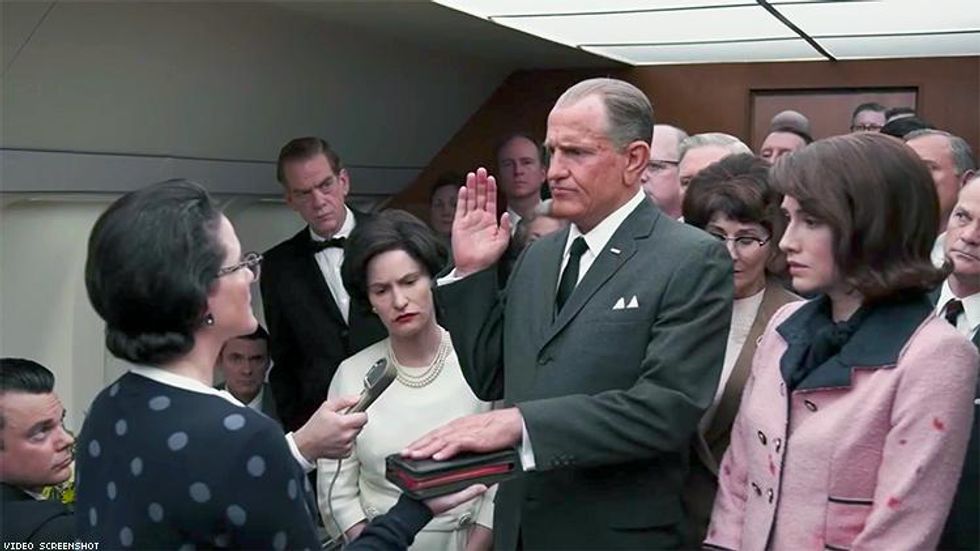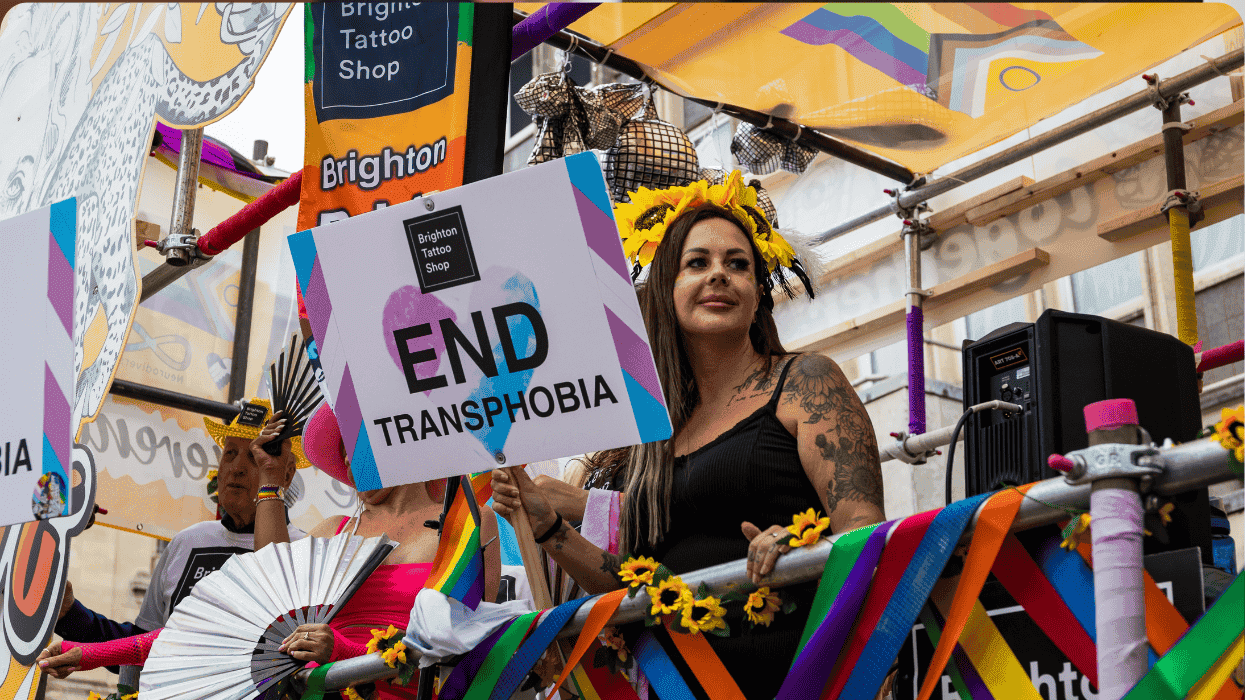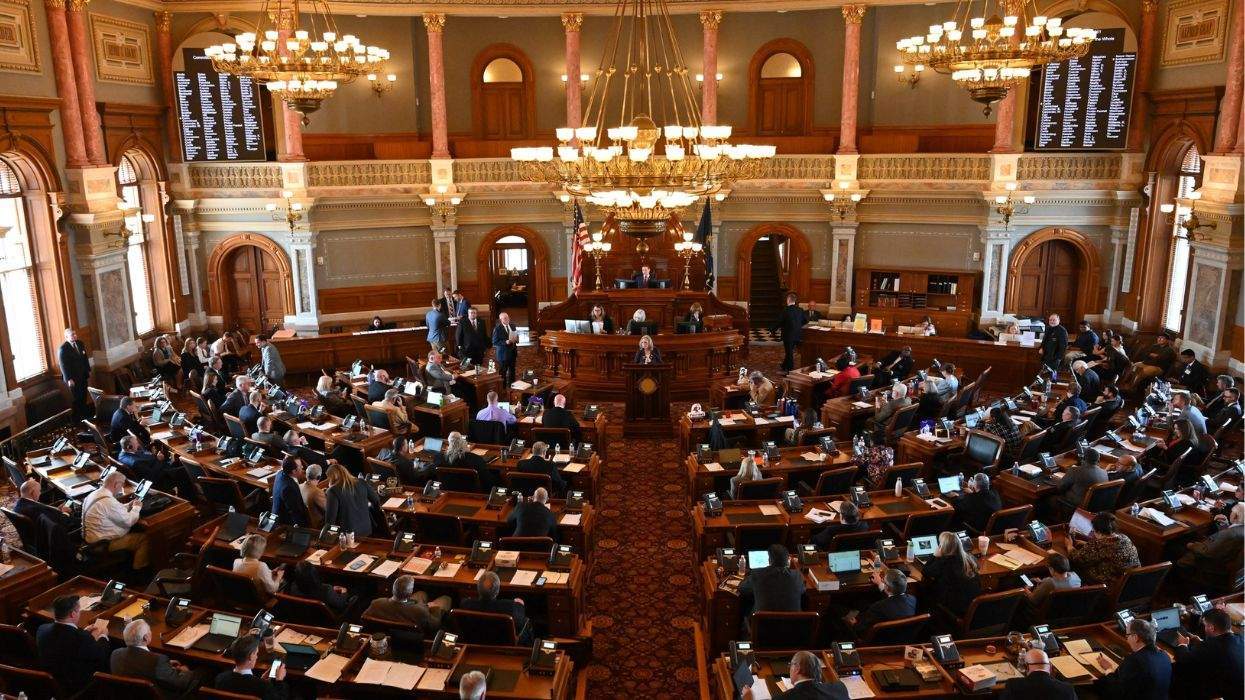The Equality Act would guarantee protection for LGBT people against discrimination in employment, housing, and more, because it simply amends the 1964 Civil Rights Act to include us. It could adapt for LGBT people the legal gains made for African-Americans in one swift move.
As the Equality Act languishes in a Republican Congress, we get a film this awards season -- LBJ -- that looks back at the president who got Congress to pass that original Civil Rights Act against great odds -- maybe greater odds than we face now.
The Lyndon B. Johnson given to us in director Rob Reiner's new film is not the same you've seen already in Selma, or in the Bryan Cranston HBO film and Broadway play. He is largely a man whose character is revealed only in comparison to another man -- John F. Kennedy.
You need a "workhorse," LBJ tells the idealistic crew of Kennedy acolytes from New England. They come to Washington with their good looks, and charm, and ideas about the way things ought to be. Johnson went to Washington and mastered it, becoming an expert on the timing and handshaking needed to get legislation passed.
In Selma, LBJ was portrayed as a sometimes reluctant foil for the activist efforts of Martin Luther King Jr. Not so in this film, where the focus is on what's happening inside the White House and inside the head of LBJ.
"I kind of wanted to make it a character piece that gave the audience a fuller view of who this person was," Reiner says in a phone interview. "I mean, everybody knows a lot about his accomplishments and the tragedy at Vietnam and how he basically destroyed his presidency. People don't have a grasp about how complex a character he was. Most people have this kind of view of him in a two-dimensional way. He's kind of the bull in the china shop and twisting larger-than-life kind of guy, but he had this very insecure side. I wanted to try to see if I could capture the complexity of the guy, and the best way to do that was to show how the strength that he had to be able to take on the burden of becoming president at the time, and also the insecurities that he had about himself and not feeling like he was was going to be loved."
Woody Harrelson stars as Lyndon B. Johnson in LBJ
Maybe understanding how to gain passage of the Equality Act will require understanding the man who laid the basis for it. Reiner suggests it might've been that need to be loved that drove Johnson. It was both his greatest strength and sometimes debilitating weakness.
Despite his reputation as a vote-whip known for strong-arming members of Congress, Johnson is paralyzed by a decision on whether to jump into the race for president against JFK in 1960. He does, but only after long consternation about whether the public actually wanted him to. He lost the nomination but went on to become Kennedy's vice president.
Part of the portrayal's focus is dictated by Reiner basing his script on a New Yorker article by Robert Carroll, who told the story of Johnson taking over after Kennedy's assassination. It was an "awesome burden," as Reiner tells The Advocate. The timing of the tragedy also made it possible to pass the Civil Rights Act, Reiner suggests. Then it took LBJ to step in and put action behind Kennedy's legacy of ideals.
LBJ was perfectly suited for the job. The Texan had struck up a kinship with the Southern Democrats who had pledged to defeat any and all advances for black Americans. These were racist men, but men who Johnson knew how to talk with.
Reiner is quick to point out that, although Johnson could speak their language, it was a language of shared identity and not shared racist ideas.
Maybe the closest modern comparison in the fight for LGBT rights is President Obama, who inspired a sea change in public opinion among black Americans on marriage equality.
"I'd like to believe that Obama was always in favor of marriage equality," says Reiner. "But I think that he probably felt that politically, it was at a certain point in time, not something the country was ready for."
Obama came out publicly for marriage equality as he ran for reelection. That he could win the office while being supportive of same-sex marriage sent a political message to his entire party.
"There's a time and a place for things," says Reiner, pointing to his work with Chad Griffin -- who is now president of the Human Rights Campaign -- on the American Foundation for Equal Rights. The organization sued for marriage equality in California even as the leading LGBT activist groups said it wasn't time. It turned out the groups were wrong. A shift in public opinion was cresting along with a legal battle and the culmination of both helped win at the Supreme Court, which ruled for marriage equality nationwide just two years after the foundation's suit brought down California's Proposition 8. Johnson might have looked at the whip count on the bench as well, noting where it looked like the votes might come from. In the end, it was Justice Anthony Kennedy who made the swing vote for equality in 2015.
"It may have felt like we were out in front of things, but we felt we were right there with what needed to be done," recalls Reiner. "I think Lyndon Johnson was the same. When he always said 'I want to count. Give me a count. You're giving me 'about 38, that's not a count.' He wouldn't push something unless he knew he could get it done. That's the same thing we thought. Although a lot of people calculated a different way, we calculated we had at least five votes."
When Reiner looks at the Equality Act and whether it can pass, he sees the lessons from Johnson.
"First of all you need to know what you're doing is right," he says. "And any time you're trying to get any group of people the same rights as some another group, then you know you're doing the right thing."
That was maybe the Kennedy role. Then comes the Johnson.
"You really do have to know how the mechanism of government works," he says. "And if you don't understand where things are, you're just going to be pissing into the wind. You're wasting your time. But if you do understand it, and Chad Griffin to me is as brilliant as it gets; he's a great strategist. He understands how to do things and when he says go, you go. That's what you need. You need great leadership like Chad is, like Lyndon Johnson was, he was a great, great leader. Knowing how the system works and knowing how to get things done, that's the key."
With all the division in the country now, it could feel impossible to make progress. And without a leader in the White House to sign legislation, it's a nonstarter there. But when the timing is ready, change will come.
Johnson won despite the racists who still held on to power in Congress and in the country. Reiner isn't shy about calling President Trump's supporters racists. And when he uses that word, he's not changing its definition. They are in the exact mold as Sen. Richard Russell of Georgia, who his film uses to epitomize the climate of the time.
"It's the same. It's the same thing," he insists loudly before outlining what minorities now face.
"Here's what's so disturbing about all of this," he says. "I've been around a long time, and you get lulled into a sense that things are moving in the right direction. It's like you're on a glide path, and you look at what was happening with race relations -- you did have Brown v. Board of Education, you had the Civil Rights Act, you had the Voting Rights Act, you had Loving v. Virginia, 1967."
Then the culture changes and the glide path only lulls you further, he warns.
"You had the biggest star on daytime television was Oprah Winfrey. The biggest star in nighttime television at that time was Bill Cosby. The biggest star in movies was Will Smith. Then Barack Obama becomes president of the United States," lists Reiner. "You say, 'Well, here we go, we're on a glide path in terms of racism because the country has accepted an African-American as president.' But what you didn't realize -- I didn't realize -- is that this undercurrent of racism is still there. It's bubbling under."
Trump has tapped into what remained, Reiner says.
"Then a guy like Donald Trump comes along and his whole platform is to delegitimize Obama and say he's not a legitimate president and unearths all this racism that was there all along," says Reiner. "Now it's being given voice by Trump. I think there's a lot of white people in this country who are very angry at the idea that they're seeing the browning of America, that we're becoming more of what we imagine democracy to be -- which is everybody's created equal. Everybody."
LBJ is now in theaters.
















